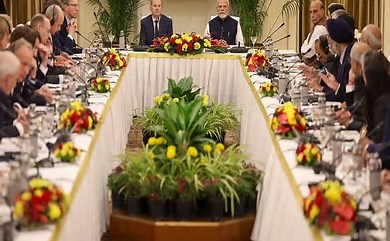In a joint statement following the 7th India-Germany Inter-Governmental Consultations, Prime Minister Narendra Modi and German Chancellor Olaf Scholz voiced “deep concern” over the ongoing conflict in Ukraine and its tragic humanitarian toll. Both leaders emphasized the importance of achieving a “just and lasting peace” in accordance with international law, ensuring respect for sovereignty and territorial integrity.
Urgent Plea for Peace in Ukraine
Reflecting on the devastating impacts of the Ukraine conflict, Modi and Scholz condemned the use of force and the threat of nuclear weaponry, calling it “unacceptable.” They stressed the urgent need for peace, highlighting the toll of the conflict on global food and energy security, particularly affecting developing and least-developed countries. The statement reinforced their commitment to the UN Charter’s principles as they reaffirmed a desire for a swift and peaceful resolution.
Gaza Crisis and Hostage Release Appeal
The escalating violence in Gaza and Israel also featured prominently in their discussions. Condemning the Hamas attacks on October 7, they expressed grave concern over the loss of civilian lives and growing humanitarian crisis in Gaza. Modi and Scholz jointly urged for an immediate ceasefire, the release of all hostages, and the immediate improvement of access to humanitarian aid throughout Gaza.
The leaders also urged regional players to act with restraint to prevent the conflict from further destabilizing the Middle East. They expressed particular concern about the deteriorating situation in Lebanon and called for diplomatic resolutions in accordance with UN Security Council Resolution 1701.
Support for a Two-State Solution
With regard to the long-standing Israel-Palestine conflict, Modi and Scholz reaffirmed their commitment to a negotiated two-state solution. The leaders emphasized the establishment of a sovereign, viable Palestinian state coexisting with Israel, while acknowledging Israel’s legitimate security concerns.
Standing Against Terrorism
The two leaders unequivocally condemned terrorism and violent extremism in all forms, stressing that terrorism poses a serious threat to global peace. They emphasized coordinated international action against terrorist organizations, including groups listed under UNSC 1267 sanctions. Modi and Scholz urged countries to eliminate terrorist havens and dismantle terror networks.
Strengthening Ties with Germany
German Chancellor Olaf Scholz’s visit marked his third to India since becoming Chancellor in 2021, underscoring the strengthening ties between the two nations. His previous visits included a bilateral meeting in February 2023 and participation in the G20 Summit held in India in September.







